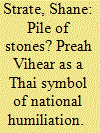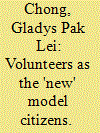| Srl | Item |
| 1 |
ID:
120005


|
|
|
|
|
| Publication |
2013.
|
| Summary/Abstract |
The most recent border tensions between Thailand and Cambodia represent only the latest round of conflict over the status of Preah Vihear (Thai: Phra Viharn). This article uses newspaper and archival material to explore the modern history of the temple, largely from the Thai perspective, and focuses on how Preah Vihear has become the centrepiece of a Thai discourse on National Humiliation. Beginning with Prime Minister Phibun Songkhram's irredentist campaign of 1940, the Thai have associated these ancient ruins with the legacy of Western imperialism, particularly the territory 'lost' to French Indochina. For Thai nationalists, the 1962 international court case that awarded sovereignty over the temple site to Cambodia is an example of neo-imperialism that is part of this legacy. Thai media coverage of the court case compared the Preah Vihear situation with past defeats, including the loss of the four provinces in 1946 and the Franco-Siamese crisis of 1893. Conversely, Sihanouk and Cambodian leaders constructed a counter-narrative that compared Thai claims to Preah Vihear with the long history of Siamese imperialism in the region. It is Preah Vihear's centrality in National Humiliation discourse, rather than its religious or architectural significance, which makes it a powerful icon.
|
|
|
|
|
|
|
|
|
|
|
|
|
|
|
|
| 2 |
ID:
104093


|
|
|
|
|
| Publication |
2011.
|
| Summary/Abstract |
Voluntary services and the word 'volunteer' have been discursively highlighted as something 'new' in China in the last few years. The large number of volunteers involved in relief work following the 5/12 Sichuan earthquakes, in the Beijing Olympics in 2008, and in the 2010 Shanghai Expo are examples of this yet understudied phenomenon. This article aims to examine volunteerism and its close relationship with the production of model citizens. It attempts to shed light on how China uses soft power - through appeal and attraction - in its governing strategies. Informed by Foucault's work on governmentality, this article aims to show how promotional strategies and training materials pertaining to volunteering programmes acted as governing strategies that invoked and produced specific power relationships through which the state governed its citizens. Taking the Beijing Olympic volunteer programme as a case to examine how a new model citizenry is produced, I trace three discourses: dream and glory, hosting a great Olympics, and not to 'lose face'. These discourses shape citizens' everyday lives; they help volunteers internalize and embody the ideal of a model citizen, and as such they are part of the organized practices through which subjects are governed in China.
|
|
|
|
|
|
|
|
|
|
|
|
|
|
|
|